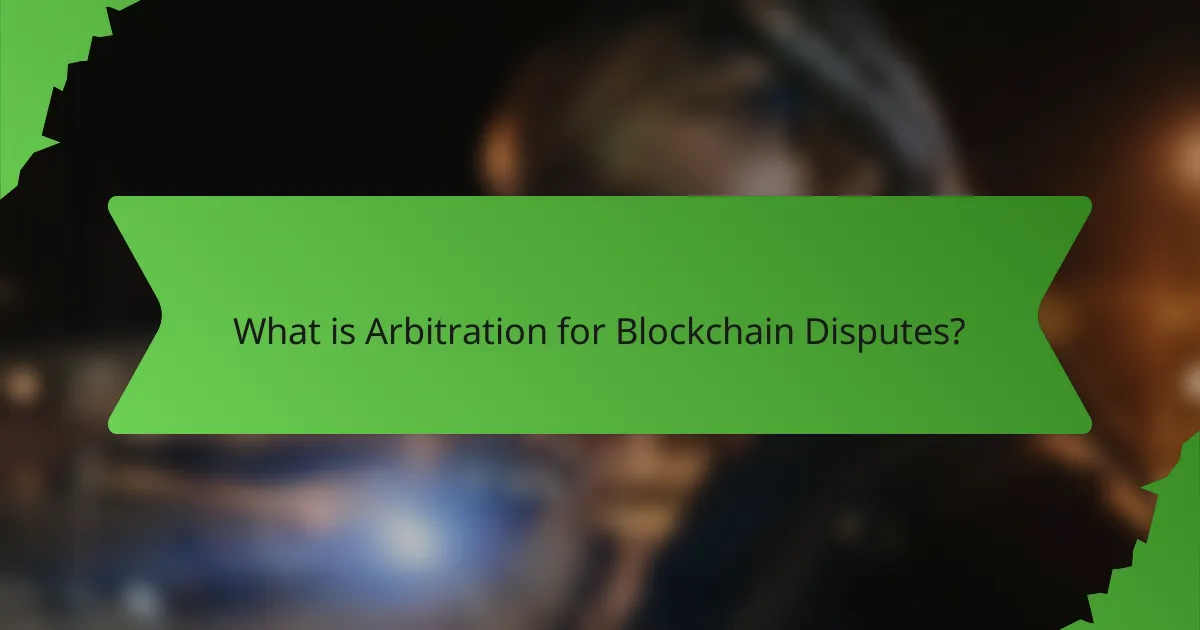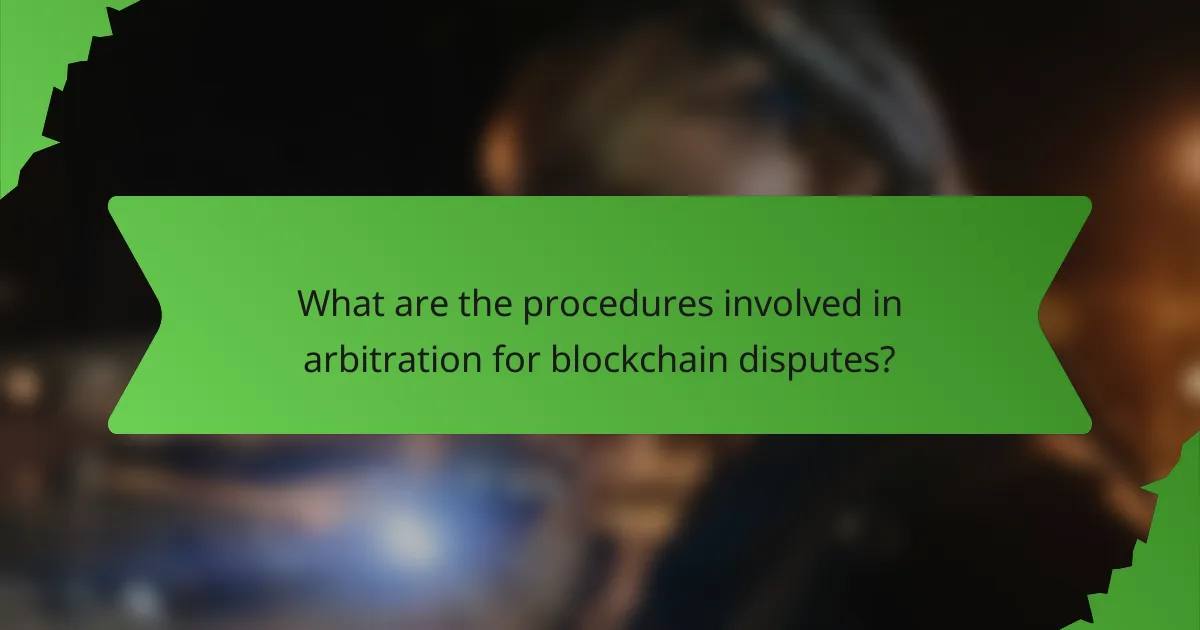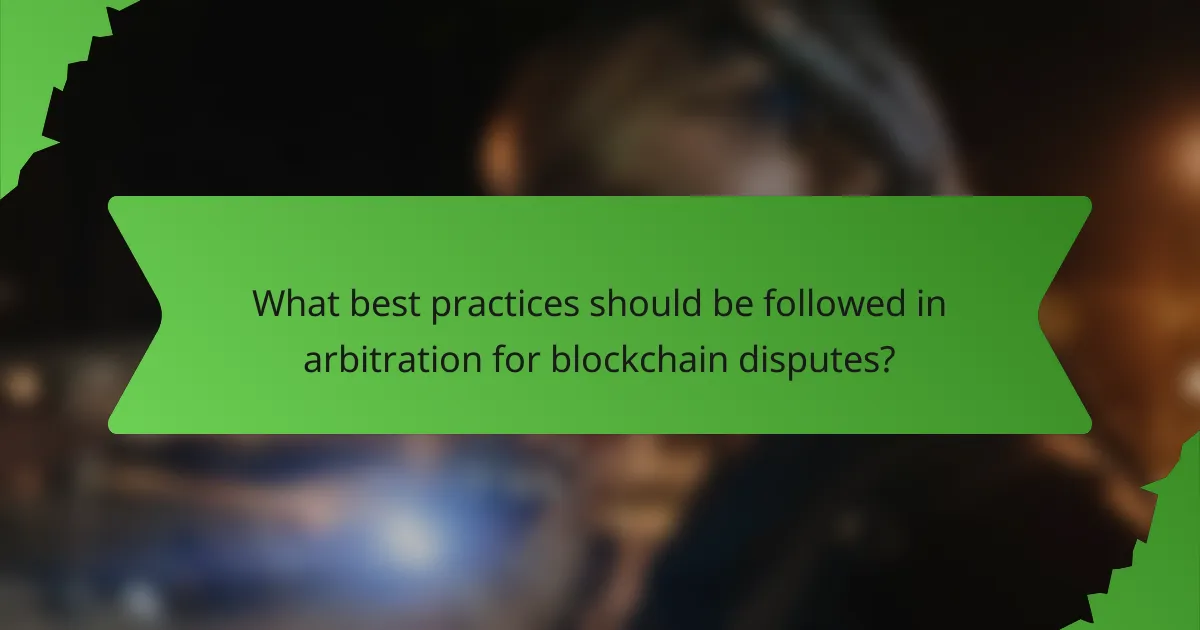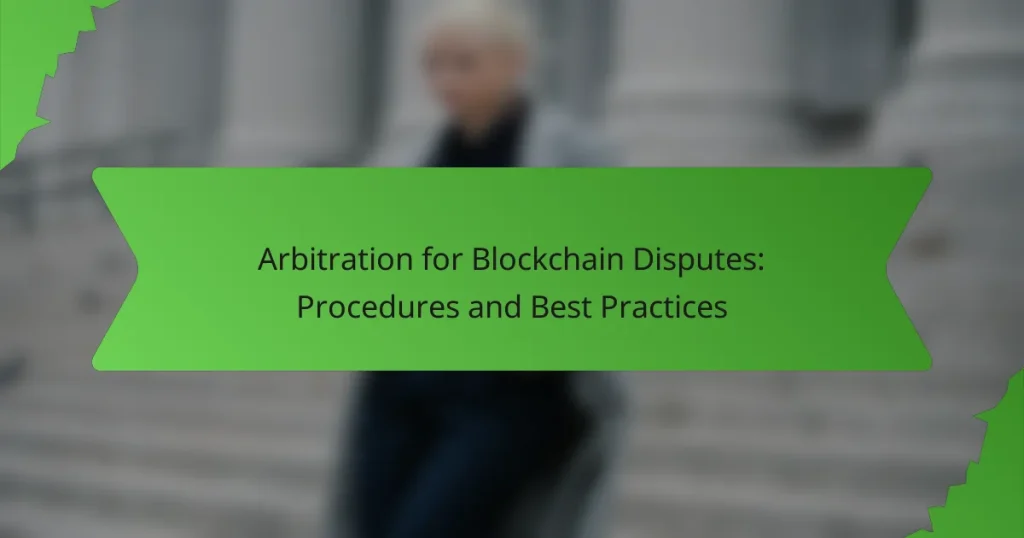Arbitration for blockchain disputes is a method of resolving conflicts arising from blockchain transactions through a neutral third party who makes binding decisions. This process is favored for its efficiency and confidentiality, often outlined in smart contracts on various blockchain platforms. The article details the key procedures involved in arbitration, including the submission of requests, appointment of arbitrators, and the hearing process. It also highlights best practices such as establishing clear jurisdiction, ensuring transparency, and utilizing technology to enhance communication. Legal frameworks, including the UNCITRAL Model Law, support the legitimacy of arbitration in the blockchain context, promoting structured and fair resolutions to disputes.

What is Arbitration for Blockchain Disputes?
Arbitration for blockchain disputes is a method of resolving conflicts that arise from blockchain transactions. This process involves a neutral third party who reviews the case and makes a binding decision. Arbitration is preferred for its efficiency and confidentiality compared to traditional litigation. It allows parties to select arbitrators with expertise in blockchain technology. Many blockchain platforms incorporate arbitration clauses in their smart contracts. These clauses facilitate quicker resolutions, often avoiding lengthy court procedures. The use of arbitration in blockchain disputes is supported by various legal frameworks, including the UNCITRAL Model Law on International Commercial Arbitration. This framework provides guidelines that enhance the legitimacy of arbitration in the blockchain context.
How does arbitration differ from traditional dispute resolution methods?
Arbitration differs from traditional dispute resolution methods primarily in its binding nature and procedural flexibility. In arbitration, parties agree to submit their dispute to an arbitrator or a panel, who makes a final decision. This decision is usually binding and enforceable in courts, unlike mediation, which seeks to facilitate a resolution without imposing a decision. Arbitration often allows for a more streamlined process, with rules tailored to the parties’ needs, contrasting with the formal procedures of litigation. Additionally, arbitration typically involves limited discovery and fewer formalities, which can expedite resolution. These differences make arbitration a preferred option for many businesses, especially in complex cases like blockchain disputes, where efficiency and expertise are crucial.
What are the key characteristics of arbitration?
Arbitration is a method of resolving disputes outside the courts. It involves a neutral third party, known as an arbitrator, who makes binding decisions. The process is typically private and confidential. Arbitration is often faster than traditional litigation. It allows parties to choose their arbitrator, ensuring expertise in the relevant field. The rules of procedure can be flexible, tailored to the needs of the parties. Arbitration awards are generally enforceable in multiple jurisdictions under international treaties like the New York Convention. This method can reduce costs compared to court proceedings.
Why is arbitration suitable for blockchain disputes?
Arbitration is suitable for blockchain disputes due to its flexibility and efficiency. Blockchain technology often involves cross-border transactions. Traditional court systems can be slow and cumbersome in such cases. Arbitration offers a faster resolution process. It allows parties to choose arbitrators with expertise in blockchain. This ensures informed decision-making on technical issues. Additionally, arbitration proceedings are generally confidential. This is important for parties concerned about sensitive information. The enforceability of arbitration awards is also strong under international treaties. This adds an extra layer of security for parties involved in blockchain transactions.
What are the primary types of arbitration applicable to blockchain disputes?
The primary types of arbitration applicable to blockchain disputes are institutional arbitration and ad hoc arbitration. Institutional arbitration involves established arbitration institutions that provide rules and procedures for resolving disputes. Examples include the International Chamber of Commerce (ICC) and the London Court of International Arbitration (LCIA). Ad hoc arbitration, on the other hand, allows parties to create their own rules and procedures outside of established institutions. This flexibility can be beneficial for resolving disputes unique to blockchain technology. Both types of arbitration can effectively address issues such as smart contract disputes and jurisdictional challenges in blockchain transactions.
How does institutional arbitration work in the context of blockchain?
Institutional arbitration in the context of blockchain involves the use of established arbitration institutions to resolve disputes arising from blockchain transactions. These institutions provide a structured framework for arbitration, ensuring that disputes are handled efficiently and fairly. The process typically begins with the parties agreeing to submit their disputes to a specific arbitration institution, which may have its own rules tailored for blockchain-related issues.
Once a dispute arises, the parties file their claims with the institution, which appoints an arbitrator or a panel of arbitrators with expertise in blockchain technology. The arbitration process usually includes a preliminary hearing, evidence presentation, and a final hearing. This structured approach allows for a clear and enforceable resolution.
The use of blockchain technology can enhance transparency and security in the arbitration process. Smart contracts can automate procedural steps and enforce arbitration agreements. Additionally, blockchain can provide an immutable record of evidence and communications, which can be crucial in resolving disputes.
Institutions like the International Chamber of Commerce (ICC) and the London Court of International Arbitration (LCIA) have started incorporating blockchain considerations into their arbitration rules. This adaptation reflects the growing recognition of blockchain’s impact on commerce and the need for appropriate dispute resolution mechanisms.
What is ad hoc arbitration and how is it used in blockchain disputes?
Ad hoc arbitration is a flexible dispute resolution process tailored to the specific needs of the parties involved. It does not rely on pre-established institutional rules and allows the parties to create their own procedural framework. In the context of blockchain disputes, ad hoc arbitration is increasingly relevant due to the decentralized nature of blockchain technology. Parties can select arbitrators with expertise in blockchain and cryptocurrency issues, ensuring informed decision-making. This method accommodates the unique characteristics of blockchain transactions, such as anonymity and cross-border issues. Furthermore, ad hoc arbitration can be more cost-effective and quicker than institutional arbitration, which is crucial in fast-paced blockchain environments. Overall, it provides a customizable approach to resolving disputes that may arise in blockchain applications.

What are the procedures involved in arbitration for blockchain disputes?
Arbitration for blockchain disputes involves several key procedures. Initially, parties submit a request for arbitration to the designated arbitration institution. This request outlines the nature of the dispute and relevant details. Next, the institution appoints an arbitrator or a panel of arbitrators based on the agreement between the parties.
Following the appointment, a preliminary meeting occurs to establish the arbitration timeline and procedural rules. The parties then exchange written submissions, including evidence and legal arguments. An oral hearing may be conducted where parties present their cases.
After the hearing, the arbitrator deliberates and issues a final award. This award is binding and enforceable under international arbitration conventions. The procedures ensure a structured resolution of disputes in the blockchain context, promoting efficiency and fairness.
How is the arbitration process initiated?
The arbitration process is initiated by a party submitting a request for arbitration. This request is typically sent to the designated arbitration institution. The request must include relevant details about the dispute and the parties involved. It should also specify the relief sought by the initiating party. Upon receipt, the arbitration institution reviews the request for compliance with its rules. If compliant, the institution will formally notify the other party. This notification includes information about the initiation and next steps. The process then continues with the selection of arbitrators and scheduling of hearings.
What steps are involved in filing a request for arbitration?
To file a request for arbitration, follow these steps: First, review the arbitration agreement for relevant provisions. Next, prepare a written request that includes the parties’ names, contact information, and a statement of the dispute. Then, submit the request to the designated arbitration institution, along with any required fees. After submission, the institution will confirm receipt and provide further instructions. The institution will then appoint an arbitrator or a panel of arbitrators. Finally, both parties will receive a notice detailing the arbitration process and timeline. These steps ensure compliance with arbitration protocols and facilitate a structured resolution process.
What role does the arbitration agreement play in the process?
The arbitration agreement establishes the framework for resolving disputes outside of court. It outlines the procedures and rules that parties must follow during arbitration. This agreement ensures that both parties consent to arbitration as the method of dispute resolution. It typically specifies the arbitrator’s powers and the governing law. The clarity of the arbitration agreement can prevent misunderstandings and streamline the process. Moreover, it can enhance efficiency by providing a defined pathway for resolution. Ultimately, the arbitration agreement is crucial for setting the stage for a fair and organized arbitration process.
What are the stages of the arbitration process?
The stages of the arbitration process include the initiation, selection of arbitrators, hearing, and award issuance. The process begins with one party submitting a request for arbitration. This request outlines the dispute and the relief sought. Next, the parties select arbitrators, often from a panel or institution. The hearing stage follows, where both parties present their evidence and arguments. After the hearing, the arbitrators deliberate and issue an award. This award is binding and enforceable, concluding the arbitration process. Each stage is crucial for ensuring a fair resolution of disputes.
What happens during the preliminary meeting?
During the preliminary meeting, the parties involved discuss the arbitration process. They outline the issues to be resolved and establish a timeline for proceedings. The arbitrator may clarify the rules and procedures that will govern the arbitration. Each party has the opportunity to present their initial positions and evidence. This meeting sets the framework for future meetings and hearings. It aims to promote efficiency and clarity in the arbitration process. Documentation related to the case may also be exchanged. Overall, the preliminary meeting is crucial for organizing the arbitration effectively.
How is evidence presented and evaluated in arbitration?
Evidence in arbitration is presented through documents, witness testimonies, and expert opinions. Parties submit evidence according to established rules and procedures. The arbitrator evaluates evidence based on relevance, reliability, and materiality. They consider the credibility of witnesses and the weight of the evidence presented. Each party typically has the opportunity to cross-examine witnesses. The arbitrator may also request additional evidence if necessary. The evaluation process is guided by the principles of fairness and impartiality. This structured approach ensures that all relevant information is considered in reaching a decision.

What best practices should be followed in arbitration for blockchain disputes?
Best practices in arbitration for blockchain disputes include establishing clear jurisdiction and applicable laws. Parties should agree on the arbitration rules beforehand. Transparency in the process enhances trust among participants. Utilizing technology for secure communication is essential. Arbitrators should possess expertise in blockchain technology. Timely resolution of disputes is crucial to maintain business relationships. Documenting all agreements in writing prevents misunderstandings. Engaging neutral arbitrators helps ensure fairness in the process.
How can parties prepare effectively for arbitration?
Parties can prepare effectively for arbitration by thoroughly understanding the arbitration agreement. This includes knowing the rules and procedures that govern the arbitration process. Parties should gather and organize all relevant documents and evidence that support their case. They must also identify and prepare witnesses who can provide testimony. Engaging experienced legal counsel is crucial for navigating complex issues. Developing a clear strategy for presenting arguments and evidence enhances effectiveness. Additionally, parties should practice their presentations to ensure clarity and confidence. Researching the arbitrator’s background can inform expectations and strategies.
What documentation is essential for a successful arbitration?
Essential documentation for successful arbitration includes the arbitration agreement, relevant contracts, and evidence of the dispute. The arbitration agreement outlines the parties’ consent to arbitrate. Relevant contracts provide context and terms applicable to the dispute. Evidence may include communications, transaction records, and expert reports. These documents help establish the facts and support each party’s claims. Having complete and organized documentation ensures a fair and efficient arbitration process.
How can parties select the right arbitrator for their dispute?
Parties can select the right arbitrator for their dispute by considering their qualifications and expertise. The chosen arbitrator should have relevant experience in the specific area of blockchain technology. It is essential to review the arbitrator’s past cases and decisions to gauge their understanding of the subject matter. Additionally, parties should assess the arbitrator’s neutrality and impartiality to ensure a fair process. Communication skills are also crucial, as the arbitrator must effectively mediate discussions. Finally, parties can consult arbitration institutions for recommendations on qualified arbitrators with a track record in blockchain disputes.
What are common pitfalls to avoid in arbitration?
Common pitfalls to avoid in arbitration include inadequate preparation, failing to understand the arbitration agreement, and poor communication. Inadequate preparation can lead to unorganized presentations and missed evidence. Failing to understand the arbitration agreement may result in disputes over the scope of arbitration. Poor communication can create misunderstandings between parties and arbitrators. Additionally, overlooking deadlines can jeopardize the arbitration process. Ignoring the importance of selecting the right arbitrator can lead to biased decisions. Lastly, not considering the enforceability of the arbitration award can cause complications post-arbitration. Each of these pitfalls can significantly impact the outcome and efficiency of the arbitration process.
How can parties ensure compliance with arbitration awards?
Parties can ensure compliance with arbitration awards by clearly defining the terms in the arbitration agreement. This agreement should outline the obligations and expectations of each party. Additionally, parties must select a reputable arbitration institution that has a track record of enforcing awards. They should also maintain open communication throughout the arbitration process to address any potential issues early on. After the award is issued, parties can implement mechanisms for monitoring compliance. Legal frameworks, such as the New York Convention, support the enforcement of arbitration awards across jurisdictions. This convention has been adopted by over 160 countries, providing a robust legal basis for compliance.
What strategies can enhance the efficiency of the arbitration process?
Implementing technology is a key strategy to enhance the efficiency of the arbitration process. Utilizing online platforms can streamline communication and document sharing. This reduces delays associated with physical meetings. Establishing clear procedural rules also contributes to efficiency. Defined timelines for submissions and responses can prevent unnecessary extensions.
Encouraging early settlement discussions can resolve disputes before formal arbitration begins. This approach saves time and resources for all parties involved. Training arbitrators in specific subject matter can lead to quicker decision-making. Skilled arbitrators can navigate complex issues more effectively.
Regularly reviewing and updating arbitration procedures ensures they remain relevant and efficient. Adapting to new technologies and practices can improve overall effectiveness. These strategies collectively enhance the arbitration process, making it faster and more cost-effective for blockchain disputes.
What are the future trends in arbitration for blockchain disputes?
Future trends in arbitration for blockchain disputes include increased use of smart contracts, enhanced digital evidence protocols, and the integration of artificial intelligence. Smart contracts automate dispute resolution processes, reducing time and costs. Digital evidence protocols will ensure secure and verifiable submission of blockchain records. AI can assist in analyzing complex data and predicting outcomes. These trends aim to improve efficiency and fairness in arbitration. The rise of decentralized autonomous organizations (DAOs) will also influence arbitration frameworks. As blockchain technology evolves, arbitration practices will need to adapt to new challenges and opportunities.
How is technology shaping the future of arbitration?
Technology is significantly shaping the future of arbitration by enhancing efficiency and accessibility. Digital platforms facilitate remote hearings, reducing the need for physical presence. Automation tools streamline document management and case analysis. Artificial intelligence assists in predicting case outcomes and analyzing legal precedents. Blockchain technology offers secure and transparent record-keeping for arbitration agreements and awards. These advancements lead to faster resolution times and lower costs. The integration of technology is transforming traditional arbitration practices into more modern, user-friendly processes.
What emerging practices are being adopted in blockchain arbitration?
Emerging practices in blockchain arbitration include the use of smart contracts for automated dispute resolution. These contracts facilitate predefined outcomes based on specific conditions being met. Additionally, decentralized autonomous organizations (DAOs) are being utilized to govern arbitration processes. DAOs enable community-driven decision-making and enhance transparency in resolving disputes.
Another practice is the integration of blockchain technology to maintain immutable records of arbitration proceedings. This ensures that all evidence and decisions are securely stored and verifiable. Furthermore, hybrid models combining traditional arbitration with blockchain elements are gaining traction. These models leverage the strengths of both systems for improved efficiency.
Recent studies indicate that these practices can significantly reduce the time and costs associated with traditional arbitration. Blockchain arbitration is evolving rapidly, reflecting the need for innovative solutions in the digital economy.
Arbitration for blockchain disputes is a method of resolving conflicts arising from blockchain transactions through a neutral third party who makes binding decisions. This article outlines the procedures involved in arbitration, including initiation, selection of arbitrators, and evidence presentation, while highlighting best practices for effective arbitration in the blockchain context. Key characteristics such as confidentiality, efficiency, and the ability to choose specialized arbitrators are discussed, along with the differences between institutional and ad hoc arbitration. The article also explores future trends and emerging practices, emphasizing the role of technology and smart contracts in enhancing arbitration processes.




